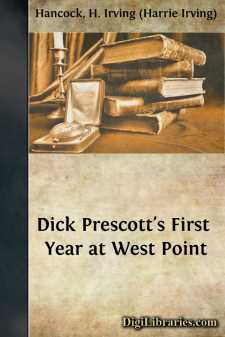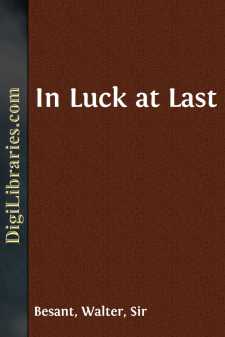Fiction
- Action & Adventure 180
- Biographical 15
- Christian 59
- Classics
- Coming of Age 5
- Contemporary Women 3
- Erotica 8
- Espionage/Intrigue 12
- Fairy Tales, Folklore & Mythology 236
- Family Life 169
- Fantasy 117
- Gay 1
- General 596
- Ghost 32
- Historical 808
- Horror 43
- Humorous 160
- Jewish 25
- Legal 4
- Medical 22
- Mystery & Detective 315
- Political 49
- Psychological 41
- Religious 64
- Romance 159
- Sagas 11
- Science Fiction 730
- Sea Stories 113
- Short Stories (single author) 537
- Sports 10
- Suspense 1
- Technological 8
- Thrillers 2
- Urban Life 31
- Visionary & Metaphysical 1
- War & Military 173
- Westerns 199
Classics Books
Sort by:
CHAPTER I "TWO TINY SPECKS OF NOTHING" "How do you feel, Dick! As spruce as you did an hour ago!" Candidate Greg Holmes put the question with a half-nervous laugh. He spoke in a whisper, too, as if to keep his agitation from reaching the notice of any of the score or more of other young men in the room of Mr. Ward, the aged notary at West Point. "I'll be glad when I see some...
more...
by:
Angela Brazil
CHAPTER I. "Say, is it fate that has flung us together,We who from life's varied pathways thus meet?" IT was a broiling day at the end of July, and the railway station at Tiverton Junction was crowded with passengers. Porters wheeling great truckfuls of luggage strove to force a way along the thronged platform, anxious mothers held restless children firmly by the hand, harassed fathers...
more...
by:
Walter Besant
CHAPTER I. WITHIN THREE WEEKS If everyone were allowed beforehand to choose and select for himself the most pleasant method of performing this earthly pilgrimage, there would be, I have always thought, an immediate run upon that way of getting to the Delectable Mountains which is known as the Craft and Mystery of Second-hand Bookselling. If, further, one were allowed to select and arrange the minor...
more...
CHAPTER I. THE TRAVELLER During the first days of the month of September, 1832, a young man about thirty years of age was walking through one of the valleys in Lorraine originating in the Vosges mountains. A little river which, after a few leagues of its course, flows into the Moselle, watered this wild basin shut in between two parallel lines of mountains. The hills in the south became gradually lower...
more...
CHAPTER I.THE BELIEF IN GOD ALMIGHTY.A study of ancient Egyptian religious texts will convince the reader that the Egyptians believed in One God, who was self-existent, immortal, invisible, eternal, omniscient, almighty, and inscrutable; the maker of the heavens, earth, and underworld; the creator of the sky and the sea, men and women, animals and birds, fish and creeping things, trees and plants, and...
more...
CHAPTER I. The sun hung glaring red near the horizon. In the valleys of the mountain ranges dark-blue shadows were gathering, while high on the forest-crowned tops the warm evening light was still aglow. The trees were gorgeous in their gay autumn livery, but in this part of the mountain dark forests of sombre evergreens covered the narrow ravines up and down, and all the swelling heights. On the...
more...
CHAPTER I. THE PLAIN—THE ISOLATED DWELLING—BLUE-BERRY PARTY—TAKING A VOTE—TREATMENT OF NEW ACQUAINTANCES—THE FAMILY AT APPLEDALE—THE YOUNG PEOPLE UPON THE PLAIN—SINCERE MILK OF THE WORD—A CALL AT THE LOG-HOUSE—THE RIDE HOME—ORIGINAL POETRY. Not more than a mile and a half from a pleasant village in one of our eastern States is a plain, extending many miles, and terminated on the...
more...
CHAPTER XI Jack Nugent's first idea on seeing a letter from his father asking him to meet him at Samson Wilks's was to send as impolite a refusal as a strong sense of undutifulness and a not inapt pen could arrange, but the united remonstrances of the Kybird family made him waver. "You go," said Mr. Kybird, solemnly; "take the advice of a man wot's seen life, and go. Who...
more...
CHAPTER FIRST. FRANCES MEETS THE SPECTACLE MAN."The bridge is broke, and I have to mend it, Fol de rol de ri do, fol de rol de ri do—"sang the Spectacle Man, leaning his elbows on the show-case, with his hands outspread, and the glasses between a thumb and finger, as he nodded merrily at Frances. Such an odd-looking person as he was! Instead of an ordinary coat he wore a velvet...
more...
Chapter I "Oh, that child! She is the very torment of my life. I have been the mother of six children, and all of them put together, never gave me as much trouble as that girl. I don't know what will ever become of her." "What is the matter now, Aunt Susan? What has Annette been doing?" "Doing! She is always doing something; everlastingly getting herself into trouble with some...
more...











